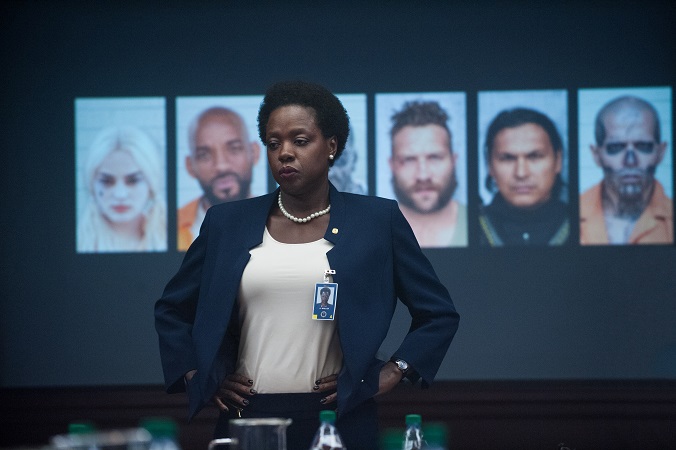
It feels good to be bad… Assemble a team of the world’s most dangerous, incarcerated Super-Villains, provide them with the most powerful arsenal at the government’s disposal, and send them off on a mission to defeat an enigmatic, insuperable entity. U.S. intelligence officer Amanda Waller has determined only a secretly convened group of disparate, despicable individuals with next to nothing to lose will do.
This is no voluntary gig. Plucked from the notorious Belle Reve Federal Penitentiary, which is designed to hold the “worst of the worst,” Deadshot and fellow inmates Harley Quinn, Killer Croc and Diablo, among others, aren’t exactly given an appealing alternative to playing along. U.S. intelligence officer Amanda Waller, a ruthless, manipulative operative who prides herself on her ability to get people to act against their own self-interest, sees to that.
Viola Davis, who plays Waller, recalls her initial discussion with director David Ayer. “Our first encounter was at his house,” she says. “I went for a meeting, and we just clicked. That happens maybe a few times in your career, where someone just gets you. They just see you and allow you to be you. That was David.”
What good can possibly come out of taking criminal renegades and blackmailing them into doing a job deemed even too down and dirty for the government’s deepest, darkest undercover agents? For U.S. intelligence officer Amanda Waller, the benefit is simple: total deniability.
Waller believes that what is best for the United States is what is best for everyone else; if it’s good for the mission, that’s what she’s going to do. She is arguably as scary as the sociopaths she’s wrangled for the job…and just as unpredictable.
“What kind of woman can out-villain these villains?” Ayer posits. “For me, Amanda Waller is fascinating and very intimidating. She’s always one step ahead of everybody, and Viola plays her with great intelligence and nuance.”
In Waller’s defense, Viola Davis admires her character’s tenacious climb to the higher echelons of the U.S. government. “She’s a superhero that doesn’t have superhero powers,” she asserts. “She doesn’t have any special abilities other than to lead and control this squad of people who do have superpowers. It’s her way of fighting evil.”
Viewed in a certain light, it’s possible to believe that Waller is as bad as any criminal, her moral compass just as broken, yet she justifies her actions with the skillful manipulation of a seasoned government agent. Her superiors condone her actions while her underlings kill in the name of whatever she demands. So long as she is on “their” side, the end will justify whatever means are necessary—even the coerced enlistment of a band of criminals whom the authorities otherwise consider irreparable and unfit for inclusion in society.
And while Waller may not show her appreciation to her mob of violent delinquents, Davis concedes, “She’s pretty impressed by each and every one of them; she thinks of them as great specimens. But she knows—and readily exploits—their weaknesses.”
Like a young daughter he may never see again? Enter Deadshot, whom Waller has quite cleverly managed to toss into Belle Reve with the aid of Gotham City’s most famous crime fighter. As the group’s (and likely the world’s) greatest assassin, he’s quite a prize for the penitentiary. But Waller has a more effective use of his talents on her mind.
“Deadshot has a daughter he loves more than anything, and he wants desperately to be a great father,” reveals Will Smith about his character. “But at the same time he keeps the lights on by being a hitman. He’s deeply conflicted by the paradox of his love for Zoe and the fact that he gets pleasure out of ridding the world of trash.”
It is this internal conflict that Waller manipulates as events unfold, promising Deadshot a chance at paternal redemption—the chance for a normal family life—no matter how unlikely it seems.
Suicide Squad opens in theaters August 5.


